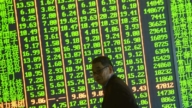【新唐人2014年09月01日訊】中國四大壞賬銀行之一準備上市並籌集上市前資本。中國華融資本管理公司從美國華平、高盛等投資者那裏吸引了24億美元。但是就在「華融」8月28日宣佈融資的同時,去年在香港上市的另外一家中國壞賬銀行「信達資產管理公司」的股票,遭遇7個月來最嚴重的單日下滑。
壞賬銀行的正式名稱是「資產管理公司」。中國四大資產管理公司是在90年代,中共為了剝離銀行壞賬而設立。四大銀行各自設立一個「資產管理公司」,它們接管了佔據四大銀行總資產15%的壞賬。「華融」為「中國工商銀行」工作,「信達」為「中國建設銀行」工作,「長城」為「中國農業銀行」工作,「中國東方」為「中國銀行」工作。
「華融」週四說,它吸引了全球80多家投資者的興趣。最終,以24億美元的價格,出售21%的股權,給一個包括中信證券、中金公司、中糧集團、高盛集團和美國華平在內的集團。「華融」董事長賴小民28號在新聞發佈會上說,它計劃今年年底之前在香港上市。
壞賬銀行以折扣價從巨頭國有銀行那裏購買不良貸款,然後處理,從中盈利。大型國有銀行「中國農業銀行」和「中國銀行」最近幾天說,它們在今年頭6個月分別出售了83億元和70億元的壞賬。與此同時「華融」7月份通過出售美元債券,籌集了15億美元。
中國最近幾年冷卻的經濟增長,卻點燃了銀行系統和其他金融領域壞賬的飆升,使得諸如「華融」和「信達」這樣的壞賬銀行對於投資者更具有吸引力。
北京「天則經濟研究所」所長助理段紹譯表示,由於國有銀行在中國處於壟斷地位,「躺著就能掙錢」,所以投資者對壞賬銀行也很有信心。
《華爾街日報》指出,壞賬銀行目前已經擴大了業務範圍,遠遠不局限於最初的不良貸款業務,現在幾乎涉足這個國家所有的金融領域。比如「華融」在銀行、信托金融租賃和證券等領域都擁有子公司。
天則經濟研究所所長助理段紹譯:「這種投資將來可能有兩個很好的投資方向。第一、用來開銀行,第二、用來收購不良資產。中國現在的經濟形勢很不好。使很多企業可能在未來不太長的時間裏瀕臨破產倒閉。破產倒閉的話,有兩種結果。第一是資產重組,第二個是賤賣資產。所以當它吸收了足夠資本的時候,它就能在市場上有優先話語權,它就能優先得到好的投資機會。」
去年「信達」成為四大壞賬銀行當中,第一家在香港上市的公司。「信達」的股票在12月份上市之後,頭兩個月內上漲了50%達到5.43港元,但是在那之後,它成為香港上市的中國金融股當中表現最差的股票今年下跌18%。
段紹譯指出,「信達」這些資本管理公司,實質上還是國有企業,他對所有國有企業的發展前景都不看好。
段紹譯:「國有企業是沒有效率的,往往是良好的動機造成可怕的結果。所以它在實際運作中,往往最終的效果還是不好。」
《金融時報》報導說,在90年代末在政府指令性借貸熱潮之後,中國銀行領域從技術上來說已經破產,壞賬佔據銀行投資組合的40%。
為了解決這個問題,北京建立了「華融」和三個其它資產管理公司將1.4萬億元的不良貸款從銀行賬簿上剝離。政府然後注入數千億元新的資本到銀行當中,出售股份給外國投資者,最終將它們全部在香港上市,但是北京仍然維持多數股權,並實際控制銀行。
中國幾大銀行向香港和上海證券交易所提交的,今年上半年的財報當中,都報告壞賬飆升。目前,中國所有的大型上市銀行的交易價格都低於賬面價值。
採訪編輯/秦雪 後製/李勇
Soaring Bad Debt In China Leads “Bad Banks" To Profit
One of the four bad Banks in China is raising its capital
and preparing for its market list.
China’s Huarong Capital Management Company attracted
$2.4 billion from investors such as the U.S. based
Warburg Pincus, Goldman Sachs and others.
However, when Huarong announced financing on Aug. 28,
another bad Chinese bank, Cinda Asset Management
Company, which was listed in Hong Kong last year,
suffered the worst single-day decline of stocks
over the past seven months.
Asset Management Company is the official name
for the bad bank.
China’s four asset management companies were
established in the 1990s by the CCP in order
to separate the bank bad debts.
Each of the four major banks set up an asset management
company for taking over 15 percent of bad debts
of the total assets of each major bank.
Huarong is a Commercial Bank of China,
Cinda a China Construction Bank,
Great Wall an Agricultural Bank of China,
and China Oriental a Bank of China.
Last Thursday, Huarong said that it had attracted
the interest of more than 80 global investors.
Eventually, it sold a 21 percent stake for $2.4 billion
to a consortium which is comprised of the CITIC Securities,
China international Capital Corporation,
China Oils & Foodstuffs Corporation,
Goldman Sachs Group and the US-based Warburg Pincus.
On Aug. 28, the Chairman of the Board of Huarong Company,
Lai Xiaomin, said on a news conference that the company
was scheduled to be publicly listed in Hong Kong
before the end of this year.
Bad banks buy bad loans from the giant state-owned banks
at a discount, and then profit off of the bad loans.
Large state-owned banks such as Agricultural Bank of China
and Bank of China, said a few days ago sold 8.3 billion Yuan
and 7.0 billion Yuan bad debts, respectively,
during the first six months of this year.
At the same time, Huarong raised $1.5 billion
in July by selling U.S. bonds.
China’s economic growth slowed in recent years,
but this ignited a surge in bad debts of the banking system
and other financial areas, making bad banks such as
Huarong and Cinda more attractive for investors.
Mr. Duan Shaoyi is the assistant of the Director
of Beijing-based Unirule Economics Institute.
He said that due to the monopoly status of state-owned
banks in China, “lying down can also make money."
Investors are also very confident in bad banks.
According to a Wall Street Journal report, currently the bad
banks have expanded their business scope far beyond
the initial non-performing loans, and now involve
nearly all of the financial sectors of the countries.
For example, Huarong Company has its own
branch companies in the areas of banking,
trust, financial leasing and securities.
Duan Shaoyi: “Such an investment in the future could be
diverted into two very good investment directions.
The first direction is to open a bank, and the second
is for the acquisition of non-performing assets.
China’s current economic situation is very poor, which might
push many Chinese companies into the verge of bankruptcy
in the coming years without a long time.
If many companies declare bankruptcy,
then there are two possible results.
The first is the reorganization of the assets,
and the second is the fire sale of the assets.
So once a bad bank absorbs enough capital,
it will be able to have prioritized speech rights
on the market, it can give priority
to good investment opportunities."
Last year Cinda become the first publicly listed bad bank
in Hong Kong of the four Chinese bad banks.
During the first two months after Cinda was listed
last December, its stock rose 50 percent to HK $5.43,
but after that, it became the worst performing stock
of Hong Kong-listed Chinese financial stocks.
It fell 18 percent this year.
Duan Shaoyi noted that comparible companies to Cinda
assets management are in essence state-owned enterprises,
and he was not optimistic on the development prospects
of all state-owned enterprises.
Duan Shaoyi: “State-owned enterprises have no efficiency.
It is very usual for a good motivation of state-owned
enterprises to produce dire results.
So in the actual operation, the final result is often not good."
Financial Times reported that in the late 1990s,
after the mandatory governmental lending boom,
the Chinese banking arena had already been technically
bankrupt.
The bad debts accounted for 40 percent
of the portfolio of the bank system.
To solve this problem, Beijing established Huarong
and three other asset management companies,
and peeled 1.4 trillion yuan of bad loans
from the state-owned banks books.
The government then injected hundreds of billions
of new capital into banks, sold shares of these banks
to foreign investors, and ultimately all of them were listed
in Hong Kong.
However, Beijing still maintains the majority of stake
and the actual control of these banks.
According to the financial reports of a few major
Chinese state-owned banks submitted to Hong Kong
and Shanghai Stock Exchanges in the first half of this year,
the bad debts soared.
At present, the transaction prices of all the major listed
Chinese banks are lower than the book values.
Interview & Edit/QinXue Post-Production/LiYong




























